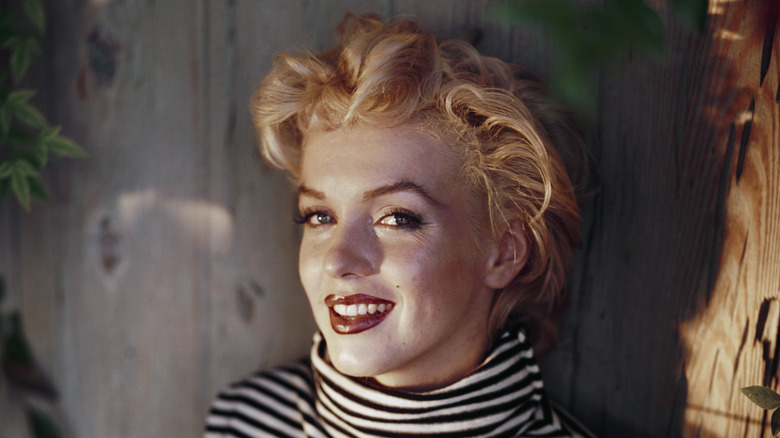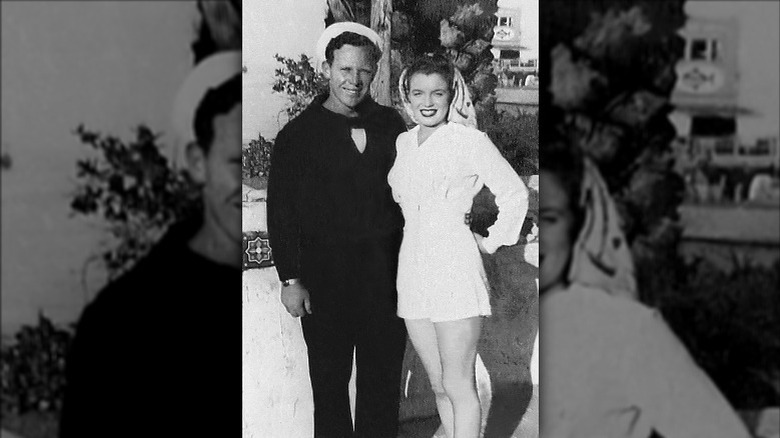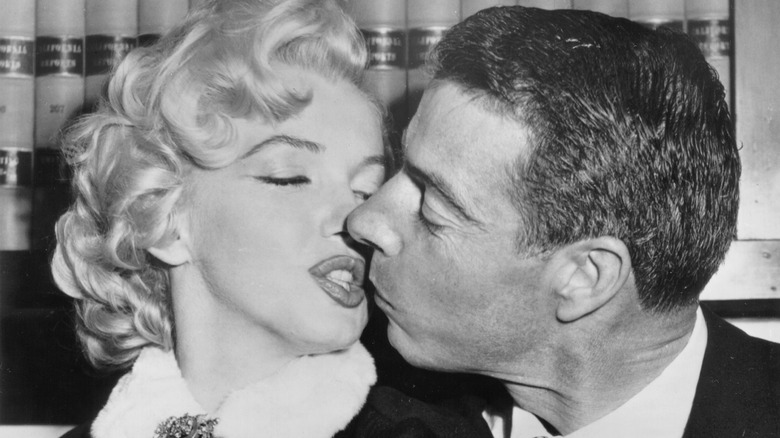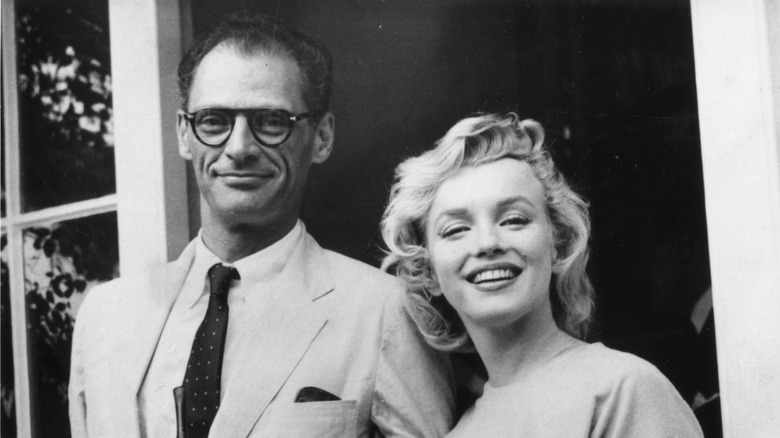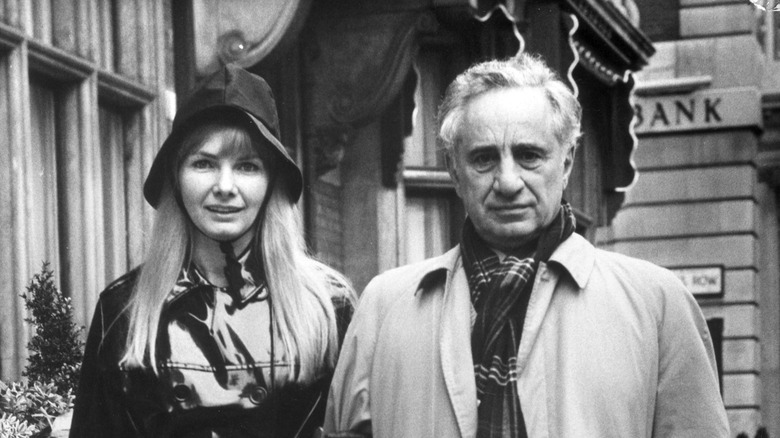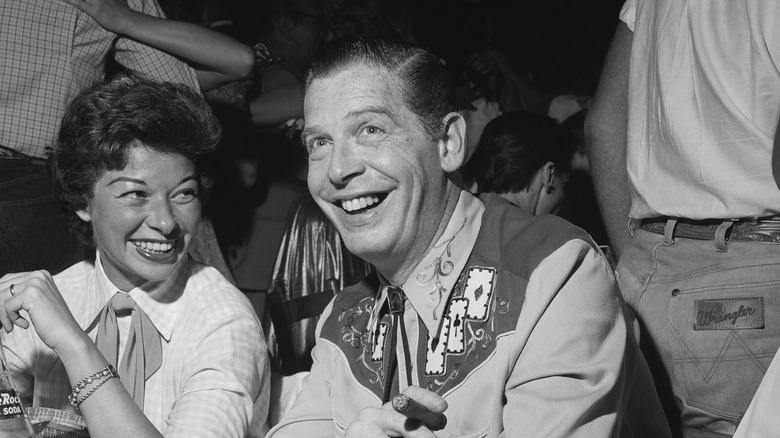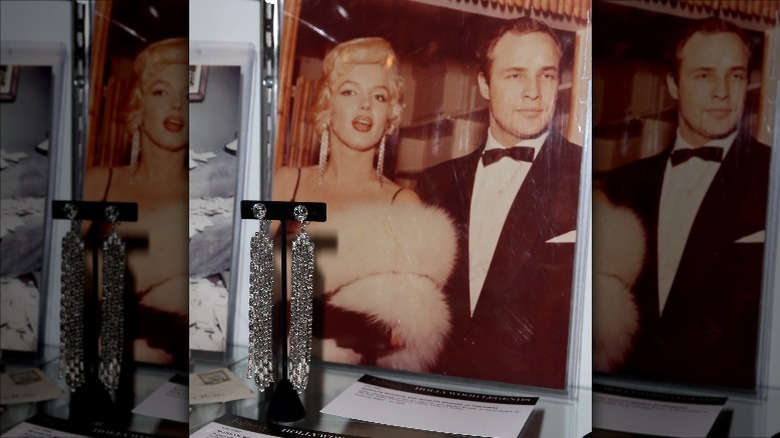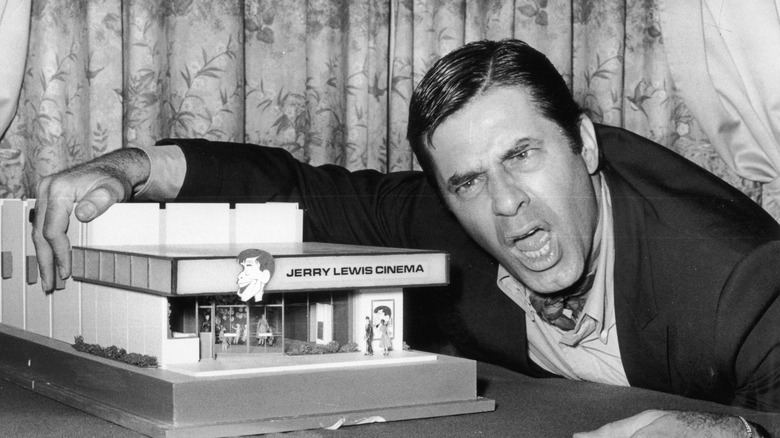What Marilyn Monroe's Exes Said About Her
Marilyn Monroe was an iconic actor of her own time and only became more iconic after her tragic death from an overdose on August 4, 1962, at just 36. As a blonde bombshell who never got the chance to grow old, she has stayed young and beautiful in the public's mind and probably always will. Even today, her image is used to sell products; social media users quote her constantly (or at least quotes they claim she said but she did not); and Kim Kardashian got headlines and criticism when she wore the actual dress Monroe wore to sing "Happy Birthday" to President John F. Kennedy on the Met Gala red carpet in 2022. (She changed into a replica for the actual event.)
While almost always reduced to her looks, Monroe was a successful actor and producer, who escaped a terrible childhood and was always looking for the happiness that eluded her. She often turned to men to help her find it, and after her death, some of those men went on the record about their relationships and Monroe generally.
This list does not include every man (and a few women) she is known or rumored to have had relationships with, as some have never talked about her publicly. The men that did choose to talk about Monroe, however, have tended to speak about her at length, with many thoughts on who she was and why she was so unhappy. Here's what Marilyn Monroe's exes said about her.
James Dougherty
James Dougherty married the then-Norma Jean Baker in 1942. She was just 16, and the relationship was a way out of a difficult childhood spent in orphanages or passed around by various relatives, including some who sexually abused her. While the future movie star filed for divorce just over four years later, Dougherty would forever be connected with her and asked about her endlessly. Even his obituary in the Los Angeles Times is mostly quotes of things he'd said about her over the years, and the headline makes clear why a former police officer's death made the paper: "James Dougherty, 84; Was Married to Marilyn Monroe Before She Became a Star."
To Dougherty's credit, he never pretended he knew the iconic version of Monroe; he almost always called his ex-wife Norma Jean when asked about her. He appeared on "Larry King Live" in 2002 and spoke about why their relationship fell apart: "She became a movie actress. ... she wanted to live together and maintain a relationship, and I told her, No, that I wanted a family."
He swore he didn't hold a grudge over her leaving though, "I thought it was wonderful that she was getting something that she wanted. And of course, Marilyn I never knew. It's a shame that she had to give up half her life for that fame. ... I was very much in love with Norma Jean."
If you or someone you know may be the victim of child abuse, please contact the Childhelp National Child Abuse Hotline at 1-800-4-A-Child (1-800-422-4453) or contact their live chat services.
Joe DiMaggio
The relationship between film star Marilyn Monroe and her second husband, sports star Joe DiMaggio, is often held up as a beautiful love story, but the reality is much more complicated. Many who knew DiMaggio said at the time or since how dangerously jealous he was of any man who was around Monroe, according to "Joe and Marilyn: Legends in Love." Some have claimed he hit and even stalked her. They would divorce after less than a year of marriage, although they remained good friends afterward.
Many of DiMaggio's thoughts on his late ex-wife come from his talks with his podiatrist Rock Positano, who recounted them at length in his book "Dinner With DiMaggio: Memories of an American Hero." DiMaggio was not shy about the recollections he shared with Positano, even telling him of his relationship with Monroe, "When we got together in the bedroom, it was like the gods were fighting; there were thunderclouds and lightning above us."
But the baseball player also saw the sad side of his wife's personality. "Marilyn was a good kid, but she was a confused kid," he told Positano. And while DiMaggio wanted children, Monroe knew her chances of having them were slim: "Marilyn was hurt by the woman thing — her inability to have children."
If you or someone you know is dealing with domestic abuse, you can call the National Domestic Violence Hotline at 1−800−799−7233. You can also find more information, resources, and support at their website.
Hal Schaefer
Hal Schaefer is not a household name today like most of Marilyn Monroe's exes, but it's possible he suffered more for his relationship with her than any other man. A musician and vocal coach in Hollywood in the 1950s, Schaefer originally met Monroe when he was hired to help her sing better for the film "Gentlemen Prefer Blondes," according to "Goddess: The Secret Lives of Marilyn Monroe." She requested him as her vocal coach on several films after that. Schaefer remembered, "She struck me as kind of fey, as not being altogether in this world, not all there. She was quiet, didn't open up much. At first she had no confidence, but she reacted to my teaching and she got better. ... she really became quite good..."
Spending so much time together eventually led to an intimate relationship, which was a problem, since Monroe was married to Joe Dimaggio at that time, and he was an extremely, even dangerously, jealous man. Schaefer found himself threatened, followed, and bugged in order for Dimaggio's associates to get information on their relationship. Schaefer ended up attempting suicide, after which, Monroe nursed him back to health. But their relationship would not survive.
As for why it happened in the first place? "I think she regarded it as her function, being this great attractive female, that she was supposed to have sex with a man, because that was something she could do, that she could give," Shaefer said.
If you or anyone you know is having suicidal thoughts, please call the National Suicide Prevention Lifeline by dialing 988 or by calling 1-800-273-TALK (8255).
Arthur Miller
Arthur Miller was already a famous playwright by the time he met Marilyn Monroe. Their marriage was her longest relationship, lasting four and a half years before they divorced in 1961. She died the following year, and Miller spend a long time working out his demons connected to their time together. In 1964, he wrote his first play based on her, "After the Fall," and even at 87, he was still getting inspiration from Monroe, writing one called "Finishing the Picture," where a Monroe-type woman is an important — but never actually seen — character, as reported in Playbill.
As a talented writer, it's not surprising Miller has some of the most beautiful quotes about Monroe. In "Timebends: A Life," he wrote, "...she was a poet on a street corner trying to recite to a crowd pulling at her clothes." He fully believed in her talent, as he said when they were married: "I took her as a serious actress even before I met her. I think she's an adroit comedienne, but I also think she might turn into the greatest tragic actress that can be imagined" (via "Marilyn Monroe: Her Films, Her Life").
But he also saw the worst of her demons, explaining, "She was a very serious girl who was struggling. ... against abandonment and abuse. Against her family's fundamentalist religion. She was in rebellion, and expected punishment" (via "Frank & Marilyn: The Lives, the Loves, and the Fascinating Relationship of Frank Sinatra and Marilyn Monroe").
Elia Kazan
Elia Kazan was the award-winning director of films including "On the Waterfront," "East of Eden," and "A Streetcar Named Desire." However, his legacy was stained when he threw some of his fellow creatives under the bus in front of the House Un-American Activities Committee when it was trying to root out Communists in Hollywood. This action was so controversial that when he received an honorary Oscar in 1999, hundreds protested outside the theatre, and many in the audience stayed defiantly seated and didn't clap for him.
Someone else who wasn't thrilled with Kazan, but for a totally different reason, was his first wife, Molly Day Thatcher. The two married in 1932 and Kazan (pictured with his second wife, Barbara Loden), had affairs several times, including with Marilyn Monroe. When "The Selected Letters of Elia Kazan" was published in 2014, the world learned how Kazan explained the affair to Thatcher.
While the letters read as pretty cruel to his wife (Kazan wrote he "resent[ed] being made to feel guilty" about cheating on her) he was nicer about Monroe. Kazan explained, "She was talented, funny, vulnerable, helpless in awful pain, with no hope, and some worth and not a liar, not vicious, not catty, and with a history of orphanism that was killing to hear. She was like all Charlie Chaplin's heroines in one," and "She is nothing like what she appears to be now ... She was a little stray cat when I knew her."
Milton Berle
Comedian and revolutionary TV star Milton Berle knew Marilyn Monroe longer than most people in Hollywood, having met her when she was starting out and getting roles as chorus girls. As quoted in "Marilyn in Manhattan: Her Year of Joy," Berle said of that time, when he and the budding actor had a romantic relationship, that "there was nothing cheap about her. ... She had respect for herself. Marilyn was a lady."
The two major stars would cross paths again many times before Monroe's death. They maintained a friendship and even worked together when Berle had a small part in Monroe's film "Let's Make Love" in 1960. Having gone from a background member of the chorus to one of the world's biggest movie stars, Berle said of Monroe as the 1960s rolled around, "The wide-eyed naïve Marilyn I had first known was gone. This Marilyn was more beautiful than ever" (via "Icon: The Life, Times and Films of Marilyn Monroe").
Marlon Brando
Marilyn Monroe and Marlon Brando were never in a movie together; the closest they came was in 1954, when Monroe was up for a lead in a film Brando was set to star in, although in the end, neither made the movie. They were in each other's orbits, however, because both actors were students of Lee Strasberg, who considered the pair the best performers he ever taught, according to "They Knew Marilyn Monroe: Famous Persons in the Life of the Hollywood Icon."
While a relationship between the two was never admitted by either, it is one of the most persistently rumored of her unacknowledged liaisons, up there with Frank Sinatra, John F. Kennedy, and Robert F. Kennedy. When Brando did speak about her, it was in glowing terms.
Monroe came up several times in a series of cold-calling interviews author James Grissom conducted with Brando for a book he was writing. As quoted on the author's blog, at one point Brando said: "Some glorious things are simple things. People drive for miles to see a mountain. Others make trips to pull over and look at an acre of wildflowers. I can still have my breath taken away by a sunset. ... Marilyn [Monroe] was a field of wildflowers, a gamboling puppy in the backyard, a pink sunset in June. She was glorious, and we had to look. Is that talent? I don't care. It was magical. And then it was gone. Is there a moral? Yes. Everything ends."
Jerry Lewis
Jerry Lewis was a hugely successful performer, both in Las Vegas with his partner Dean Martin, as well as a solo act in films like "The Nutty Professor." He performed for four presidents over the years and met several more. When Amy Wallace sat down with Lewis in 2017 for a profile in GQ, she certainly expected to talk about all those highlights of his life, which also made it into the article. But after Lewis made a racy claim about him and Marilyn Monroe, it's hard to remember all the rest of it.
Lewis acknowledges that he constantly cheated on his wife, although he says it's impossible he slept with every leading lady in his films since he found one of them unattractive. But the interview appears to be the first time this spreading of wild oats connected him to Monroe. After stating that there was no way the actor had the much-rumored affair with President John F. Kennedy, Lewis stated, "And the only reason I know is because I did. Okay?" Asked about the experience by the unbelieving Wallace, Lewis reflected, "It was ... long. I was crippled for a month. And I thought Marlene Dietrich was great!"
While it is odd that this information did not come out until 55 years after Monroe died, Lewis did say something that rang true, because it was very similar to what some of Monroe's other lovers had said: "She needed that contact to be sure it was real."
